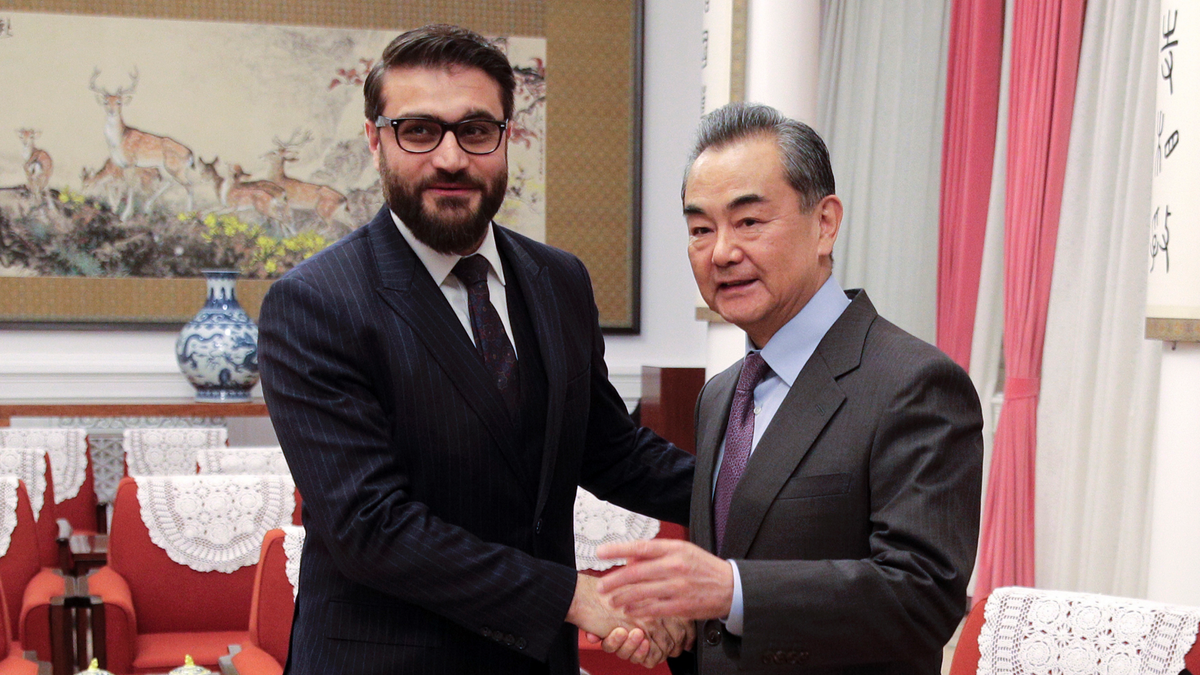
FILE - In this Jan. 10, 2019, file photo, Afghanistan national security adviser Hamdullah Mohib, left, shakes hands with Chinese Foreign Minister Wang Yi before proceeding to their meeting at the Zhongnanhai Leadership Compound in Beijing. Hamdullah Mohib is blasting U.S. talks with the Taliban, saying the Trump administration has alienated the Afghan government, legitimized the militant network and is crafting a deal that will never lead to peace. (AP Photo/Andy Wong, Pool)
WASHINGTON – Afghanistan's national security adviser on Thursday blasted the U.S. talks with the Taliban, saying the Trump administration has alienated the Afghan government, legitimized the militant network and is crafting a deal that will never lead to peace.
"If we are to make peace, it cannot be just a mere deal out somewhere far away where were not in the loop," Hamdullah Mohib said at a blunt and candid briefing with reporters that prompted a scolding by State Department officials.
Mohib, the former Afghan ambassador to the United States, also took aim at Zalmay Khalilzad, the U.S. point man negotiating with the Taliban. He suggested that the negotiations conducted by Khalilzad, a veteran American diplomat who was born in Afghanistan, are clouded by Khalilzad's political ambitions to lead his native country.
"The perception in Afghanistan and people in the government think that perhaps — perhaps — all this talk (with the Taliban) is to create a caretaker government of which he will become the viceroy," Mohib said, adding that Khalilzad had eyes on the Afghan presidency in both 2009 and 2014 when Ghani was elected.
He said more transparency about what the U.S. and the Taliban have discussed would help to quell misinformation and rumors. He said the Afghan government is the last to find out what has transpired at the negotiating table and has resorted to getting information by tracking tweets from the foreign minister in neighboring Pakistan, or brief readouts from U.S. officials involved.
"We are told that Ambassador Khalilzad is a great diplomat," Mohib said. "Well, I'm not sure I buy that because he is ostracizing and alienating a very trusted ally and partner."
"We think either Ambassador Khalilzad doesn't know how to negotiate or there are other reasons behind what he's doing. But what he's doing is not getting a deal that would result in peace."
State Department deputy spokesman Robert Palladino dismissed Mohib's comments. He said David Hale, undersecretary of political affairs, summoned Mohib Thursday afternoon to reject his criticism about the U.S. talks with the Taliban.
"Hale underscored the longstanding U.S. assistance and support to Afghanistan, and expressed our commitment to the Afghan government's stability and full participation in the peace process," Palladino said.
He said Khalilzad represents Secretary of State Mike Pompeo and that "attacks on Ambassador Khalilzad are attacks on the department and only serve to hinder the bilateral relationship and the peace process."
Mohib insists that the U.S. is keeping the Afghan government in the dark. He said he has no information to share with Afghanistan's 350,000 police and soldiers, who have taken heavy casualties from the Taliban. He said in the past five years, 45,000 Afghans have been killed in the fighting — 36,000 security forces and 9,000 civilians.
"What are they fighting for? How am I supposed to convince them that they are not being sold out?" Mohib asked.
"As national security adviser, I have no information to share with those who are fighting for Afghanistan on the front line."
The longest session between the U.S. and the Taliban, lasting 13 days, ended this week with both sides citing progress toward ending the 17-year war in Afghanistan, but many questions remain unanswered.
The Taliban are negotiating from a position of strength: They effectively control half the country, and President Donald Trump has made clear he is frustrated with America's longest war, wants to see a peace deal and is determined to bring at least some U.S. troops home.
The two sides have reached a draft agreement on the withdrawal of U.S. troops — a longtime Taliban demand — and the insurgents have rebuffed U.S. efforts to get them to negotiate with the Kabul government. Khalilzad has said that when the draft agreement about a withdrawal timeline and effective counterterrorism measures is finalized, the Taliban and other Afghans, including the government, will begin intra-Afghan negotiations on a political settlement and comprehensive ceasefire.
Mohib said the Taliban are planning a "full-on" spring fighting offensive, emboldened by their sit-downs with American negotiators and have no inclination to negotiate with the Afghan government.
"There is no reason for them to do so," he said, adding that the legitimacy they've won from the talks has prompted them to boast that foreign ministers from around the world are seeking to meet with them.
In the talks, the Taliban have said they will prevent Afghanistan from being used as a base for launching terror attacks, as it was prior to 9/11. But the insurgents have provided no specifics on what that would entail, and it remains unclear whether they are willing or able to confront other militant groups, some of which are longtime allies.
"Our understanding is even if there is a deal, it's a bad deal," Mohib said, adding that any Taliban guarantees that Afghan soil will not be used again as a launching pad for terror attacks amounts to "having cats guard the milk."









































